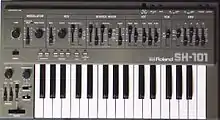Roland SH-101
The Roland SH-101 is an analog synthesizer manufactured by the Roland Corporation between 1982 and 1986. Though it was a commercial failure, it became a staple of electronic music in the 1990s, particularly house music.
| SH-101 | |
|---|---|
 Roland SH-101 grey model | |
| Manufacturer | Roland |
| Dates | November 1982-1986 |
| Price |
|
| Technical specifications | |
| Polyphony | Monophonic |
| Timbrality | Monotimbral |
| Oscillator | 1 VCO with 3 simultaneously mixable waveforms : Pulse with PWM, Saw and Sub wave (selectable -1 Oct. Square, -2 Oct. Square or -2 Oct Pulse) The Pulse wave can be modulated by LFO, by Envelope or manually Noise is also available at the oscillator mixing stage |
| LFO | 1 LFO: triangle, square, random and noise waveforms |
| Synthesis type | Analog subtractive |
| Filter | 1 resonant VCF, modulated with ADSR, LFO, keyboard tracking and/or bender controller |
| Attenuator | ADSR envelope, triggered by gate or LFO |
| Aftertouch expression | No |
| Velocity expression | No |
| Storage memory | 100 step sequencer |
| Effects | Arpeggiator (up, down, up/down) |
| Input/output | |
| Keyboard | 32-note |
| Left-hand control | Bender assignable to VCF frequency and/or pitch as well as pitch bend and mod wheels on attachable handle |
| External control | CV/Gate |
Sound and features
The SH-101 is monophonic, meaning it can only play one note at a time. It has a single oscillator and a sub-oscillator, a low-pass filter, a mixer allowing users to blend different waveforms plus a noise generator, and an arpeggiator and sequencer.[1] An ADSR envelope generator controls the filter and VCA, and the filter, VCA, pitch and pulse width can be controlled with an LFO. Users can attach an optional handgrip with modulation controls and shoulder strap to play the SH-101 as a keytar, and it could also be powered via battery.[1] According to MusicRadar, the SH-101 has "snappy and razor-sharp" bass, "squelchy and expressive" leads, and a "piercing yet smooth" filter.[1]
Release
The SH-101 launched in the US at $495 and in UK at £249,[2] making it much more affordable than the popular digital synthesisers of the time.[1] Roland marketed the SH-101 to the emerging keytar market, with magazine slogans such as "freedom for expression" and “[the 101] takes you where you want to go".[2] However, it was outsold by the digital Yamaha DX7 and was discontinued in 1986.[2]
Legacy
During the 1990s resurgence of analogue synthesisers, the 101 became a staple in dance music studios.[1] It was used by acts including Aphex Twin, Orbital, the Prodigy, 808 State, the Grid, Future Sound of London, and Paul Frick from Tangerine Dream.[2]
In 2014, MusicRadar wrote: "Some inexpensive synths were brilliant 'for the price'. The Roland SH-101 was brilliant, period. Never a rock star's instrument like the Minimoog or Prophet-5, the 101 was a synthesiser for the rest of us, and a damned fine one, too."[1] In 2016, Fact named the SH-101 one of the 14 most important synthesisers in history.[3]
References
- Tech, Computer Music2014-04-17T13:55:00 106Z. "Blast from the past: Roland SH-101". MusicRadar. Retrieved 2019-08-17.
- "Red Bull Music Academy Daily". daily.redbullmusicacademy.com. Retrieved 2019-08-17.
- "The 14 most important synths in electronic music history – and the musicians who use them". FACT Magazine: Music News, New Music. 2016-09-15. Retrieved 2019-08-17.
